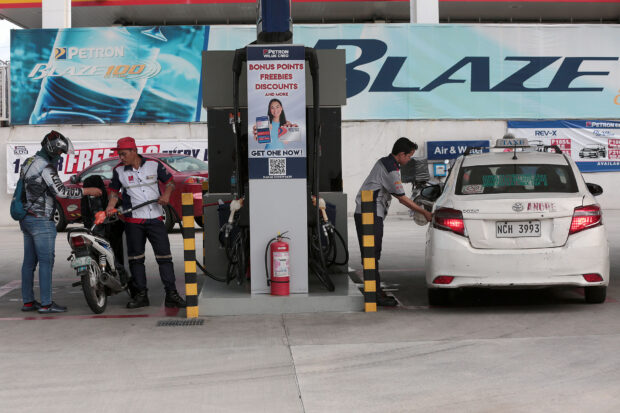Fuel price increases seen to continue in next 2 months

Gasoline attendants fill up motorists’ tank on Monday, Aug. 14, 2023. Petroleum companies announced price adjustments for kerosene, diesel, and gasoline which would take effect on Aug. 15. (Photo by GRIG C. MONTEGRANDE / Philippine Daily Inquirer)
MANILA, Philippines — Oil firms raised the pump prices of petroleum products for the sixth week in a row on Tuesday, with prices climbing by as much as P2.50 per liter as Saudi Arabia continues its production cuts amid rising demand.
In separate advisories, the companies said they raised the prices of gasoline by P1.90 per liter and diesel by P1.50 per liter. The price of kerosene likewise rose by P2.50 per liter.
This marks the sixth straight week of price increases for diesel and the fifth for gasoline.
Last week, fuel prices rose by up to P4 per liter, the highest such increase this year.
This resulted in a year-to-date net increase of P11.50 per liter for gasoline, P7.10 per liter for diesel, and P2.60 per liter for kerosene.
Article continues after this advertisementRodela Romero, assistant director of the Department of Energy (DOE) Oil Industry Management Bureau, warned that prices will likely further increase over the next two months, citing price projections of S&P Global Platts.
Article continues after this advertisementLocal oil prices are based on the Mean of Platts Singapore, or the daily average of all trading transactions of diesel and gasoline in the Singapore market.
“Historically, [in the] second half of the year, prices of petroleum products start to increase due to an increase in demand … Therefore, whatever developments in the international oil market would just reflect in the domestic pump price,” Romero told the Inquirer in a Viber message.
Rollbacks
Oil companies last implemented rollbacks in early July when the retail prices of petroleum products stood between P50.83 and P78.50 per liter.
This time last year, prices reached P63.60 to P83.35 per liter.
“Consumers may use their power of choice to avail [themselves] of the best prices and services offered by the retail stations or gasoline stations,” Romero said.
The recent price hikes in petroleum products were also influenced by the cut in daily output from Saudi Arabia, according to the DOE official.
Saudi Arabia, the world’s largest oil exporter, previously said it would cut crude production by 1 million barrels of oil per day (b/d), resulting in a two-year low of 9 million b/d.
This developed as the Paris-based organization International Energy Agency (IEA) projected that global oil demand will climb by 2.2 million b/d to 102.2 million b/d this year, with China accounting for more than 70 percent of the growth.
According to IEA’s Oil Market Report published earlier this month, global oil supply dropped by 910,000 b/d to 100.9 million b/d in July due to the Saudi Arabia production decline, thus pushing prices up.